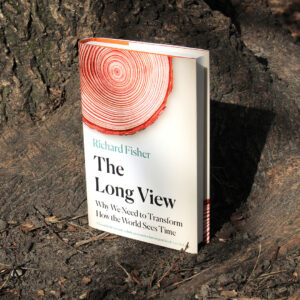Richard Fisher, a senior journalist at BBC Global News, explains the motivation behind his book, “The Long View”, which has just been published.

Inspired by research during a fellowship at Massachusetts Institute of Technology in the US, Richard aimed to understand: the roots of the world’s short-termist predicament; the history and psychology of how we think about time and the future and the philosophy and ethics of the long term. But it was also a book inspired by more personal experiences.
Future generations
When my daughter Grace was born, it occurred to me that she could live to see the twenty-second century. She’ll be eighty-six, which is not improbable with advances in healthcare and longevity. Sometimes, I imagine her on New Year’s Eve, welcoming 2100 with her own family as the fireworks explode in the sky, loved ones embrace, and “Auld Lang Syne” is sung. But what kind of world will she be welcoming? Throughout my career as a journalist, I have encountered this date – 2100 – within various news stories, reports or forecasts, but they are rarely celebratory:
- Rising seas and wild weather threaten to drown cities by 2100
- Humanity has a 1 in 6 chance of extinction by the end of the century
- Nearly half the planet’s species could be wiped out in 2100
- Automation will leave humans jobless by the twenty-second century
A worsening world?
The year 2100 is so often depicted as a milestone within a worsening world – embroiled in climate catastrophe, biodiversity collapse and technological disruption. Meanwhile, we face a litany of invisible short-termist incentives and deterrents that have come to influence business strategy, political policies, media coverage and even the choices we make as individuals.
A long view can help humanity
However, I do not believe that this should be cause for helplessness or resignation. By embracing the long view, we can learn to navigate through the challenges we face this century, as well as recognise and overcome the temporal stresses that trap us in the moment. With a more “long-minded” perspective, we can approach the future as a place filled with autonomy and choice, a place of branching possibilities.
During the course of writing “The Long View”, I encountered a growing number of long-minded individuals, organisations, academics, foundations and politicians who are converging on the belief that it’s possible to unlock a longer-term perspective.
From long-standing participatory rituals to academic movements created out of fear of looming existential catastrophe, myriad “long views” have emerged independently in various cultures, practices and faiths around the world. While they differ in their approaches they share the goal of extending the mind across time – asking that we think beyond ourselves and consider the plight of future generations.
Some approaches to long-mindedness are rooted in abstract philosophical calculations, like the “longtermists” concerned over the sheer scale of the unborn. Quantitatively minded thinkers such as these tend to urge that we take a view of the long-term future wherein we try to maximise the well-being of the people living there. It is a view rooted in trade-offs, economic principles and thought experiments.
We can learn from our predecessors
While this approach promises a novel way of seeing our ethical priorities, it does not represent the only way to think long-term. Long-mindedness, to me, is broader than a calculation about the hypothetical unborn, and should be grounded in the relationships we hold today and with our predecessors. This belief is echoed by many other approaches to long-mindedness, such as the ones you find in various spiritual practices. In Zoroastrianism, practitioners keep their faith alive by protecting an everlasting flame and in the Shinto faith followers rebuild their grand Jingu shrine in a practice that has lasted for over 1,300 years. Other more secular traditions exist as well, from the chalking of the White Horse of Uffington to a poem being written in the streets of Utrecht one letter at a time every Saturday at lunchtime.
Ultimately, long-mindedness has many expressions, but the ones that typically move us the most are those that can help us see our connection with people across time. By considering our chain of ancestry stretching forward and backward in time, future generations cease to be strangers.
This personal relationship with time is a thread that runs throughout “The Long View”. Through our generational ties – past, present and future – it is possible to extend one’s perspective far beyond the moment, even beyond one’s own lifespan. It is my belief that we can use this extended perspective for the betterment of future generations.
Get the book
“The Long View” is available in hard back or ebook formats. A paperback version will be available in 2024.
Help us to be able to do more
Now that you’ve reached the end of the article, we want to thank you for being interested in IF’s work standing up for younger and future generations. We’re really proud of what we’ve achieved so far. And with your help we can do much more, so please consider helping to make IF more sustainable. You can do so by following this link: Donate.
